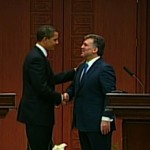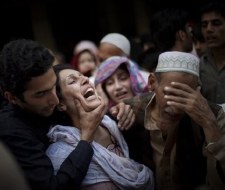Turkey, We Need You: Obama's Ankara Speech
 Tuesday, April 7, 2009 at 9:58
Tuesday, April 7, 2009 at 9:58 Related Post: Video of President Obama's Speech in Ankara
 So, after his high-profile participation in the G-20 and NATO summits, after the set-piece excitement of his speech to French and German, President Obama spoke in Turkey yesterday. And, while most of the US media missed the story, his address was just as significant as his statements on the global economy and intervention in Pakistan-Afghanistan.
So, after his high-profile participation in the G-20 and NATO summits, after the set-piece excitement of his speech to French and German, President Obama spoke in Turkey yesterday. And, while most of the US media missed the story, his address was just as significant as his statements on the global economy and intervention in Pakistan-Afghanistan.TURKEY, THE US NEEDS YOU
Both the New York Times and Washington Post are still so caught up with the broad notion of Obama's "engagement" with the Islamic world that they missed the depth in Obama's approach to the Turkish Government and people. This was a talk which recognised that Ankara has a central place in both short-term and longer-term American initiatives and, doing so, set aside other general issues that could trouble the US-Turkish relationship.
From his opening sentences, Obama elevated Turkey's importance:
I have been to the G-20 Summit in London, the NATO Summit in Strasbourg and Kehl, and the European Union Summit in Prague. Some people have asked me if I chose to continue my travels to Ankara and Istanbul to send a message. My answer is simple: Evet. Turkey is a critical ally.
Of course, Obama is going to offer very nice words to flatter his audience, but that inclusion of "critical" goes beyond the requirements of rhetoric.
Turkish readers can help interpret the symbolic significance of Obama's lengthy reference to Kemal Ataturk, but I was struck by his concluding phrase: "His greatest legacy is Turkey’s strong and secular democracy." The President has swept aside the chatter, which has been prevalent in the US and Europe, about the threat of "Islamism" in Turkey's political system. (And I suspect he had also swept more immediate doubts about the legitimacy of "democracy" in the rulling AKP's recent electoral success, which has been challenged by opposition parties.)
Why the extended references to "Turkey’s democracy [as] your own achievement [which] was not forced upon you by any outside power, nor did it come without struggle and sacrifice"? In part, it is to do with the Obama "engagement" with Islamic countries --- Turkey is going to be elevated as the model for others to emulate.
The initial plans of the Obama Administration were for the President to make his appeal to the Islamic world in Cairo, given Egypt's more immediate place in Middle Eastern issues and the "Arab" dimension. Those had to be set aside, however, because of the complications of the Gaza crisis and of some far-from-trivial questions about the recent Egyptian record of democracy. So step up, Ankara: "Because of the strength of our alliance and the endurance of our friendship, both America and Turkey are stronger, and the world is more secure."
This general exaltation, however, has immediate purposes, as Obama's next sentences made clear:
Our two democracies are confronted by an unprecedented set of challenges. An economic crisis that recognizes no borders. Extremism that leads to the killing of innocent men, women and children. Strains on our energy supply and a changing climate. The proliferation of the world’s deadliest weapons, and the persistence of tragic conflict.
LET'S GET SPECIFIC: WELCOME TO EUROPE
Turkey is in the right place at the right time. In the midst of economic crisis, Washington sees the country as one with great potential for growth. That is a growth that could other US allies out of the recessionary doldrums.
And that in turn eliminates any doubts about the US position on Turkey in European Union, as Obama set out in several paragraphs:
Let me be clear: the United States strongly supports Turkey’s bid to become a member of the European Union. We speak not as members of the EU, but as close friends of Turkey and Europe.
No messing about here. Obama swept aside "human rights" objections to Turkey's EU membership, citing changes in its legal system and penal codes and its granting of minority rights to Kurds.
LET'S GET SPECIFIC: THE MIDDLE EAST
More good news for Turkey. It finds itself as a "lynchpin", just as in the 1950s, for American ambitions in the Middle East and Persian Gulf.
One key issue, of course, is that of Israeli relations with Arab States. Here Obama did hide the full US agenda. He referred at length to Turkey's role in an Israeli-Palestinian settlement but omitted a more immediate item: an Israeli agreement with Syria.
There was a political sensitivity at work here. Turkish Prime Minister Recep Tayyip Erdogan's anger with Tel Aviv over the Gaza War was because it interrupted, indeed threatened to demolish, Ankara's brokering of direct Israeli-Syrian talks. Obama, both for the sake of his hosts and sensitivities in Israel, thus did not say "Syria", but the signal was clear. Washington is hoping for a resumption of the discussions and would be pleased for Turkey to take the diplomatic credit.
Obama, however, was looking beyond Israel and the Arab world with his reference to Turkey's regional importance. For Washington, Ankara now has a part to play in keeping Iran "sensible". The President was a bit ham-fisted with his emphasis on the nuclear issue, rather than the political significance of Iranian policy in the region, but Turkish leaders undoubtedly picked up on the wider message. Ankara can be a major player, as Obama pursues "engagement", working with Syria to ease Tehran into an acceptable place in discussions on the Middle East.
PROBLEMS? WHAT PROBLEMS?
Obama didn't shy away from headline issues that could have jeopardised this vision of US-Turkish co-operation. He did refer to Armenia and Cyprus, looking in each case to "reckoning with the past" and "just and lasting settlements".
That finessing of sensitive issues led Obama to Iraq, where he made clear that Washington would recognise Turkey's position over the threat from the Kurdish separatists of the PKK:
Make no mistake, though: Iraq, Turkey, and the United States face a common threat from terrorism. That includes the al Qaeda terrorists who have sought to drive Iraqis apart and to destroy their country. And that includes the PKK.
Ahh, the Obama magic. By re-framing Turkey's relationship with the Bushian legacy of Iraq in this way, the President could once again elevate Ankara's political importance in America's new fights:
We share the common goal of denying al Qaeda a safe-haven in Pakistan or Afghanistan.
Yes, Turkey, Uncle Sam and President Barack need you.





 Amidst all the flurry of Presidential announcements and Congressional hearings on Pakistan-Afghanistan, this is the most important document to sneak onto the Internet this week.
Amidst all the flurry of Presidential announcements and Congressional hearings on Pakistan-Afghanistan, this is the most important document to sneak onto the Internet this week.
 Lots of sound and not much substance (yet). That's the quick summary of US Secretary of State Hillary Clinton's address to the international conference on Afghanistan at The Hague yesterday.
Lots of sound and not much substance (yet). That's the quick summary of US Secretary of State Hillary Clinton's address to the international conference on Afghanistan at The Hague yesterday.